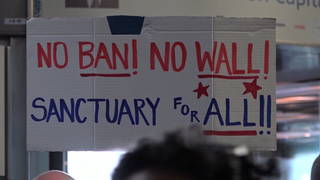
Guests
- Lee GelerntACLU attorney who presented the first challenge to the executive order on immigration. His argument resulted in a nationwide injunction.
Within 24 hours of President Trump signing his executive order on immigration, the American Civil Liberties Union filed the first legal challenges. The ACLU asked a federal judge to intervene in the case of two Iraqis detained at JFK airport. On Saturday night, U.S. District Judge Ann Donnelly in Brooklyn ordered the men released as part of a nationwide stay on part of Trump’s executive order. Her ruling temporarily blocked the deportation of valid visa holders, including those from countries listed in Trump’s ban. We speak to Lee Gelernt, the ACLU attorney who helped argue the case.
Transcript
AMY GOODMAN: So, can you go back in time to Friday, January 27th, what you were doing over at the ACLU—
LEE GELERNT: Right.
AMY GOODMAN: —and where you ended up that day?
LEE GELERNT: Yeah. So we had a call from 7:30 to 9:30 about the executive order, which had just come out at 5:00. We were hopeful that the people en route to the U.S. would be allowed in, and we were preparing a challenge for people who were still overseas. At 10:00, I start getting a text: There may be people at JFK who are being stopped. So, we gather a whole group of lawyers, from Yale, from the National Immigration Law Center and from the International Refugee Assistance Project. We stay up all night. We file a complaint on their behalf at 6:00 in the morning. We then spent all day trying to get the government to assure us they won’t remove anybody while the case goes forward. We couldn’t get those assurances. We rush in for an emergency stay. At 6:00 p.m. Saturday night, the judge says, “Be down here at 7:30.” I get down there. There’s about 50 people. And I say, “Wow! That’s great. Fifty people on a Saturday night at the courthouse in that short notice?” When I come out after arguing the case, there were a thousand people out there. I think we’re in one of those real civil rights moments where it’s not just the lawyers presenting arguments in court, but it’s the community and everyone rallying together. And I think that’s what it’s going to take.
AMY GOODMAN: And so, what happens with your case? How is it affected by this federal hearing and the decision that will come down?
LEE GELERNT: Right. So, one thing to keep in mind, especially for your listeners, is, if they traveled here in reliance on the Washington order, and even if the Washington order is overturned, they’re safe because of the injunction issued by Judge Donnelly in Brooklyn, that says no one who reaches U.S. soil can be removed. The other thing to keep in mind is, the Washington case is sort of moving ahead quickly right now, but no one knows which case is ultimately going to go first and what’s going to happen in any particular case. So that’s why we’re moving forward with all the cases. And we are going to be on a fast track, as well, in New York.
AMY GOODMAN: So you’re refiling your case?
LEE GELERNT: Well, our case has never not been in the courts, and so we are moving forward. The other thing that’s going on in our case is we’re seeing noncompliance by the administration, and that’s dangerous. Judge Donnelly very specifically said, “Give the plaintiffs a list of everyone who was detained and been affected by this executive order.” That’s 10 days ago. We still haven’t got the list. So we’ve gone back to court and say to the court, “You need to enforce this order. The administration is not complying.” We need a list of people who got here and may have been coerced into waiving their rights and removed. We know of people already who were sent back against their will. Without a list from the government, we can’t contact everyone and find out how—who knows how many people were actually sent back against their will after the case was filed?
AMY GOODMAN: How about the Justice Department lawyers, the government lawyers, saying 100,000 visas were canceled?
LEE GELERNT: Right. You know, it’s—we’re in a dramatic moment here. Hopefully, those people will get back their visas. But it’s troubling, because those people were extensively vetted. I mean, this narrative about we don’t know who these people are, it’s simply wrong. I mean, especially with the refugees, they are so extensively vetted, that—
AMY GOODMAN: And finally, the explanation of “This is Obama’s list of seven countries. This is not our list.”
LEE GELERNT: Right, right.
AMY GOODMAN: President Trump said.
LEE GELERNT: Right. But Obama didn’t put a ban. He said we’re going to do some other things with vetting. Fine. We are not against vetting, but a ban is a whole different thing.
AMY GOODMAN: Well, I want to thank you very much, Lee Gelernt, for joining us.
LEE GELERNT: Thank you.
AMY GOODMAN: ACLU attorney who presented the first challenge to the executive order on immigration. His argument resulted in a nationwide injunction. This is Democracy Now! Of course, we will continue to follow this issue. We’ll be back in a minute.












Media Options